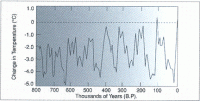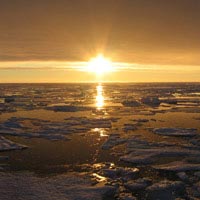Nov 02, 2007
‘Global Warming’ as Pathological Science
By James Lewis, American Thinker
There is such a thing as pathological science. Science becomes unhealthy when its only real question --- “what is true?” --- is sabotaged by vested interests, by ideological Commissars, or even by grant-swinging scientists. Today’s Global Warming campaign is endangering real, honest science. Global Warming superstition has become an international power grab, and good science suffers as a result.
Freeman Dyson, one of the great physicists (Princeton University) alive today, put it plainly enough in his autobiography:
“...all the fuss about global warming is grossly exaggerated. Here I am opposing the holy brotherhood of climate model experts and the crowd of deluded citizens who believe the numbers predicted by the computer models. ... I have studied the climate models and I know what they can do. ... They do a very poor job of describing the clouds, the dust, the chemistry and the biology of fields and farms and forests. They do not begin to describe the real world that we live in.” Read more here.
Nov 01, 2007
Bjorn Lomborg: Hotter Weather, Fewer Deaths
By Bjorn Lomborg in the Financial Post
The heat wave in Europe in early August 2003 was exceptional in many ways. It was a catastrophe of heartbreaking proportions. With more than 3,500 dead in Paris alone, France suffered nearly 15,000 fatalities from the heat wave. Another 7,000 died in Germany, 8,000 in Spain and Italy and 2,000 in the United Kingdom: The total death toll ran to more than 35,000.
Such reports fuelled the public perception that the heat wave became a sure indicator of global warming. But group wisdom can occasionally be wrong. A recent academic paper has checked this theory and concluded that although the circumstances were unusual, equal or more unusual warm anomalies have occurred regularly since 1979. Moreover, while 35,000 dead is a terrifyingly large number, all deaths should in principle be treated with equal concern. Yet this is not happening. When 2,000 people died from heat in the United Kingdom, it produced a public outcry that is still heard. However, the BBC recently ran a very quiet story telling us that deaths caused by cold weather in England and Wales for the past years have hovered around 25,000 each winter, casually adding that the winters of 1998-2000 saw about 47,000 cold deaths each year.
It is remarkable that a single heat-death episode of 35,000 from many countries can get everyone up in arms whereas cold deaths of 25,000 to 50,000 a year in just a single country pass almost unnoticed. In Europe as a whole, about 200,000 people die from excess heat each year. However, about 1.5 million Europeans die annually from excess cold. Read more here.
Oct 26, 2007
Global Warming Is Not Caused by Carbon Dioxide
By Gary Novak, Independent Scientist
When an ice age begins, global Warming occurs exactly as it is doing now. Heated oceans cause precipitation to increase. Eventually, increased snowfall will reflect away solar energy and trigger a cool-down. Arctic ice is melting faster than expected, because oceans are heating more than the atmosphere.

No atmospheric temperature increase has been found in eight years. Alarmists are not promoting science; they are promoting propaganda justified through a black-box analysis which generates contrived numbers. Science requires evidence and logic.
There is no mechanism for carbon dioxide creating global warming. “Greenhouse gases” absorb all radiation available to them in a few meters. More of the gas cannot absorb more radiation. A thick sheet of plastic does nothing more than a thin sheet. Doubling the CO2 would only shorten the distance for absorption of radiation from 10 meters to 5 meters, which is not an increase in temperature. How could all of those scientists be wrong? They get paid to be wrong through billions of dollars from government; and they are not a consensus. Read more here.
Oct 25, 2007
The Big Thaw
By JPL’s Son Nghiem and Greg Neumann
A thick chunk of Arctic sea ice the size of two states has disappeared. Is it global warming or normal causes? This very excellent video podcast explains why the decline of ice accelerated this year and why the future remains uncertain. JPL’s Son Nghiem, Research Scientist and Greg Neumann, Radar engineer, studied the ice from the Coast guard Cutter Healy and NASA’s QuikScat satellite did a good job explaining the changes, unusual wind patterns which helped feed the transpolar current with ice which “accelerated out like a runaway train.”
Nghiem said “Unusual atmospheric conditions set up wind patterns that compressed the sea ice, loaded it into the Transpolar Drift Stream and then sped its flow out of the Arctic,” he said. When that sea ice reached lower latitudes, it rapidly melted in the warmer waters. “The winds causing this trend in ice reduction were set up by an unusual pattern of atmospheric pressure that began at the beginning of this century,” Nghiem said. Read the release here.
See the podcasts here.

Oct 24, 2007
We Are Not In Climate Crisis
By Dr. William Gray
We are not in a climate crisis. The evidence presented by the global warming advocates has many flaws. There has not yet been an open and fair scientific dialogue on this topic. The much trumped ‘scientific consensus’ on global warming is bogus. There are thousand of scientists who disagree with Gore’s greenhouse gas scenario. But their voices have been largely ignored and/or their motives often denigrated. Many warming skeptics receiving federal grant support have been reluctant to express their views due to worries over the continuation of their research grants and criticisms from their warming colleagues who seek uniformity of view. Their friends may criticize them as being anti-environmental. Many younger warming skeptics concerned about their future careers refuse to confront the issue.
It’s always hard to fight an entrenched lobby with its wealthy and powerful governmental and international global warming proponents. A mild form of McCarthyism has developed toward those scientists who do not agree that human-induced global warming is a great threat to humankind. The normal scientific process of objectivity studying both sides of a question has not occurred. If our government were really interested in getting an accurate evaluation of the warming threat they would have called for and made research funds also available to skeptics and would have encouraged open dialogue between the warming skeptics and the warming believers. Such dialogue has been purposely suppressed.
The human-induced global warming scenarios that have been so much in the headlines since the hot summer of 1988 have repeatedly been exaggerated by a broad spectrum of scientists and environmentalists who have a vested interest in having and maintaining such a global warming scare. Most of these global warming advocates do not have sufficient background in meteorology and climatology to be able to realistically evaluate CO2’s potential influences on global temperature. The many Global Circulation Model (GCMs), simulations by the large US and foreign government laboratories and universities on which so many of the warming scenarios are based, have basic flaws. These global models do not correctly model the globe’s small-scale precipitation processes. They have incorrectly programmed the rain processes so as to cause large artificial and unrealistic global warming in their models. These GCMs also do not yet accurately model the globe’s deep ocean circulations which appear to be the primary driving mechanism for most global temperature change. Read more here.




